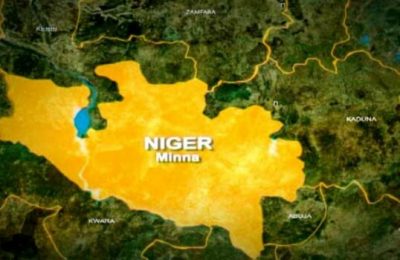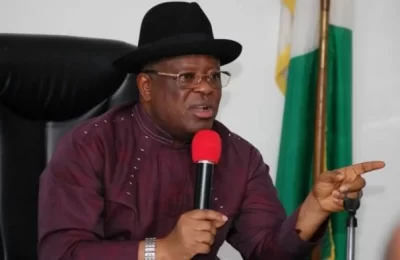
Vis-a-vis the Federal Government’s N48,000 proposed new minimum wage and Nigerian workers N615,000, CHRISTIAN APPOLOS, in the report, presents workers’ agitation for a substantial figure and why they turned down government’s ‘wage reduction’ proposal.
The Nigeria Labour Congress (NLC) and Trade Union Congress of Nigeria (TUC), on Wednesday last week, walked out on the Federal Government’s negotiating team at an ongoing minimum wage negotiation meeting for proposing to pay Nigerian workers a new minimum wage of N48,000.

According to some labour leaders who were part of the meeting, the walkout was a non-verbal unanimous decision taken by workers’ representatives.
To this end, Comrade Tommy Etim Okon, National President of the Association of Senior Civil Servants of Nigeria (ASCSN), said, “We were furious and highly disappointed that at a time inflation rate and other factors caused by government policies are unleashing untold economic hardship and suffering to workers and the masses, representatives of government could dare propose what they considered ‘wage reduction’ as a minimum wage.”
Nigerian workers had, on May Day (Workers’ Day), asked the Federal Government to pay them a living wage of N615,000. And in reaction to some comments credited to some government officials at different fora about the demand for N615,000 minimum wage being unrealistic, the leaders of the organised labour responded with explanation on how workers arrived at the figure.
President of NLC, Comrade Joe Ajaero and his TUC counterpart, Comrade Festus Osifo, gave the unions’ decision as, “The impact of the economic policies enacted under this administration has been profoundly harsh, particularly for the most vulnerable in our society – the workers, the marginalised and those on fixed incomes.
“Many of the economic policies implemented by this administration appear to run counter to these constitutional imperatives. Instead of fostering security and welfare, they have widened the chasm between the haves and the have-nots, plunging countless Nigerians deeper into poverty with each passing day. Consider, for instance, the decision to demonise subsidies on essential commodities like petrol with the attendant price hikes.
“What does this signify for the average Nigerian worker or citizen struggling to make ends meet? How does it impact their basic needs and sense of security? Moreover, the unchecked borrowing by government agencies, often at unconscionable interest rates and riddled with opaque consultancy fees, further exacerbates our economic woes.
“Food inflation, according to the National Bureau of Statistics (NBS) is at over 40 percent while headline inflation is around 33.20 percent and increasing; though it is believed to be above that given the objective realities on the ground. The implication of these to an average Nigerian family is that access to food, which is the basic necessity of life, has become very difficult. Malnutrition becomes a reality with its attendant consequences for healthy development of young children and the future of our nation.
“Real wages become impacted heavily as average workers spend over 75 percent of their income on food; meaning that to an average Nigerian worker, his real wage depreciates by about 37 percent continually so that a worker receiving N50,000 per month loses N18,500 of the value of his salary. A bag of 50kg rice is currently at N78,000, 12.5kg cooking gas is at N18,000, petrol is N680/litre and about N120,000 per month, yam and garri are out of reach, bread is N1600/loaf, milk and tea is a luxury while egg is N4,000/crate of 30pcs, etc., yet the national minimum wage is at N30,000 while some people without remorse refuse to even pay.”
Following the May Day declaration for a living wage of N615,000, Comrade Ajaero subsequently gave another explanation on the reason for the union’s demand. He said, “It has become imperative at this point that we inform Nigerians who may not have known already the foundations upon which our initial demand for a N615,000 new national minimum wage is based upon.
“The figure was a product of a painstaking effort through which we captured the cost of living of Nigerian workers and masses in all parts of the country. It was essentially an outcome of an independent research conducted by the NLC and TUC on the cost of meeting the primary needs of an average family around the country. Our research was based on a family with both parents alive and four children without the burden of having other dependents with them.
“A questionnaire was designed and sent to all the state councils of NLC and TUC from where these questionnaires were sent to our members in all the Local Government Areas in the country to gather the monthly cost of living for the average family as described above. Below is a summary of our findings and we hope that this will enable Nigerians understand what propels our demand so that better clarity is made to create better engagement around the ongoing national minimum wage negotiation process.”
He further presented a “cost of living estimate” table detailing an average Nigerian worker expenses on monthly bases. The table noted housing/accommodation, N40,000; electricity/power, N20,000; utility/water, N10,000; kerosene/gas, N35,000; food, N9,000 X 30 =N270,000; medical: N50,000; clothing: N20,000; education: N50,000; sanitation, N10,000; transportation, N110,000, totaling N615,000.
Ajaero added that “It should be noted that we arrived at this figure before the increase in electricity tariff and the recent scarcity of petrol across the nation, leading to the appearance of long queues with attendant increased transport fares. Any figure below this amount becomes a starvation wage and condemns Nigerian workers and their families to perpetual poverty.
“We have to remember that the old one having expired April 18, 2024, a new one is expected to have come into effect on April 19, 2024. However, because of government’s inability to comply with the law that demanded for negotiations for a new national minimum wage to have begun six months before the expiration of the existing one, concluding the new one has become unfortunately delayed.
“We are sure that our social partners would see our demonstration of understanding, sacrifice and reasonableness in our demands, thus accept this figure without much delay. We also enjoin all well-meaning Nigerians to implore the government and employers to meet our demands for the sake of justice, equity and national development.”
Reiterating their stand for not just a minimum wage but living wage for Nigerian workers, Comrade Ajaero and Comrade Osifo, said, “The Minimum wage struggle serves as a poignant reminder of the resistance faced by workers and the obstacles deliberately placed by the government. It underscores the pressing need for unity across all levels of engagement to advance our shared objectives. We are already working together in every facet of the national minimum wage fixing process to ensure that better results are achieved, which will not only speak to the welfare of Nigerian workers but would also assist in driving business activities around the nation.”
“We are united by a common ideology and intertwined destinies. Any leader who fails to grasp this fundamental truth does not uphold our proud traditions. Our individual aspirations must yield to collective will. Only through collective action can we lift workers and the masses from the shackles of oppression and poverty. It is based on this realisation that we want to assure you that the Nigeria Labour Congress (NLC) and the Trade Union Congress (TUC) stand resilient and more united than ever.”
The duo further showed their commitment to brokering a living wage for workers when workers’ representatives at the new minimum wage committee meeting last Wednesday, staged a walkout in protest against the Federal Government’s proposal to pay a minimum wage of N48,000 to workers.
Expressing their displeasure at the ‘meagre’ minimum wage pay proposal, a statement, jointly signed by Comrade Ajaero and TUC Deputy President, Tommy Etim Okon, read, “We are disappointed as negotiations at the tripartite national minimum wage resumed but with the apparent unseriousness of the government to engage in reasonable negotiation with Nigerian workers.
“The government’s proposal of a paltry N48,000 as the minimum wage does not only insult the sensibilities of Nigerian workers but also falls significantly short of meeting our needs and aspirations.
“In contrast, the Organised Private Sector (OPS) proposed an initial offer of N54,000, though it is worth noting that even the least paid workers in the private sector receives N78,000 as clearly stated by the OPS, highlighting the stark disparity between the proposed minimum wage and prevailing standards, further demonstrating the unwillingness of employers and government to faithfully negotiate a fair national minimum wage for workers in Nigeria.
“The government’s failure to provide any substantiated data to support their offer exacerbates the situation. This lack of transparency and good faith undermines the credibility of the negotiation process and erodes trust between the parties involved.”
“As representatives of Nigerian workers, we cannot, in good conscience, accept a wage proposal that would result in a reduction in income for federal-level workers who are already receiving N30,000 as mandated by law, augmented by President Muhammadu Buhari’s 40 percent peculiar allowance (N12,000) and the N35,000 wage award, totaling N77,000 only.
“Such a regressive step would undermine the economic well-being of workers and their families and is unacceptable in a national minimum wage fixing process. We remain committed to advocating for the rights and interests of Nigerian workers and will continue to engage in reasonable dialogue with the government if they show serious commitment to find a fair and sustainable resolution to this impasse.
“We call upon the government to reconsider its position and come to the negotiation table with clear hands that reflects the true value of the contributions made by Nigerian workers to the nation’s development and the socioeconomic realities that confront not just Nigerian workers but Nigerians today as a result of the policies of the Federal Government.
“Together, in a reasonable dialogue, we can work to give Nigerian workers a N615,000 national minimum wage as proposed by us on the basis of evidence and data. This will be in keeping with the pledge of President Bola Tinubu’s pledge to ensure a living wage for Nigerian workers.”
ALSO READ: EU recalls popular bleaching cream, Caro White lotion







